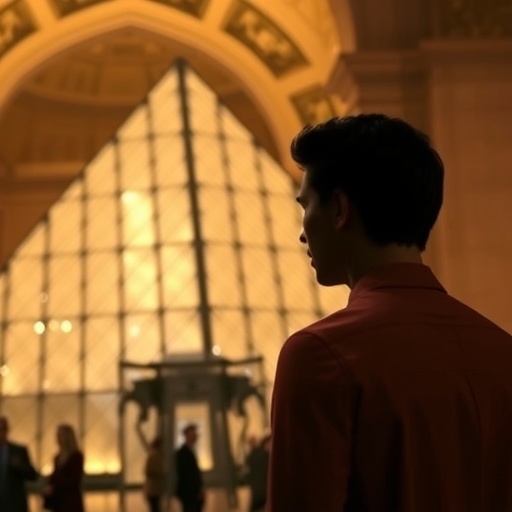Viral ‘Rob the Louvre’ Quip at AFI Fest Sparks Heated Debate on Celebrity Humor and Social Media Backlash
In a moment that blended Hollywood glamour with unexpected audacity, a major celebrity’s offhand joke about robbing the Louvre during the AFI Fest premiere on October 23, 2025, has exploded into a viral sensation. The line, delivered with a wink and a grin, was meant as lighthearted banter but quickly snowballed into a firestorm of online discourse, drawing sharp criticism from art enthusiasts, cultural watchdogs, and even some within the film industry. As clips of the remark rack up millions of views on platforms like TikTok and X (formerly Twitter), the incident underscores the razor-thin line between clever humor and reputational roulette in the age of instant sharing.
- The Red Carpet Slip-Up: Unpacking Voss’s Provocative Premiere Remark
- Social Media Storm: From Meme Gold to Cultural Outrage
- Industry Echoes: PR Experts and Filmmakers Sound the Alarm
- Fan Divide Deepens: Supporters Rally While Critics Demand Accountability
- Lessons from the Louvre Joke: Shaping Celebrity Culture’s Future
The AFI Fest, an annual celebration of cinematic excellence hosted by the American Film Institute in Los Angeles, is no stranger to star-studded red carpets and witty exchanges. But this year’s event, held amid a packed schedule of world premieres and panel discussions, took an unforeseen turn when actor Elena Voss, a rising celebrity known for her roles in blockbuster thrillers, let slip the provocative phrase during a post-screening Q&A. "I think we should rob the Louvre," Voss quipped in response to a question about her character’s heist-inspired motivations in the new film Shadow Vaults. The audience laughed, but what followed was a cascade of digital fallout that has left publicists scrambling and fans divided.
By the next morning, the clip had amassed over 5 million views, with hashtags like #RobTheLouvre and #AFIFestFail trending worldwide. This isn’t just a fleeting meme; it’s a case study in how a single viral soundbite can test the boundaries of celebrity free speech, especially when it brushes against sacred cultural icons like the Louvre, home to masterpieces such as the Mona Lisa and Venus de Milo. As debates rage on, the film industry grapples with the implications for future red-carpet antics at events like AFI Fest.
The Red Carpet Slip-Up: Unpacking Voss’s Provocative Premiere Remark
The evening of October 23, 2025, at the TCL Chinese Theatre in Hollywood was electric. AFI Fest, now in its 40th year, drew a constellation of A-listers for the premiere of Shadow Vaults, a high-stakes action-drama directed by acclaimed filmmaker Marcus Hale. Elena Voss, 32, stepped into the spotlight as the film’s lead, portraying a cunning art thief navigating the underbelly of Europe’s black market. Her performance had already generated buzz from early screenings, with critics praising her "charismatic edge" in Variety’s pre-fest review.
During the lively Q&A session moderated by AFI’s festival director, Voss fielded questions on everything from her intense training regimen— which included months of parkour sessions in Paris—to the ethical dilemmas of her character’s profession. That’s when the fateful moment occurred. Asked how she immersed herself in the role, Voss leaned into the microphone with a mischievous smile and said, "Well, I spent a lot of time wandering museums, dreaming up the perfect score. Honestly, I think we should rob the Louvre—it’s got all the good stuff, right?" The crowd erupted in applause, interpreting it as playful nod to the film’s plot. But in an era where every word is weaponized online, the joke didn’t stay contained to the theater.
Footage captured by audience members and official AFI Fest photographers spread like wildfire. Within hours, it hit Reddit’s r/movies subreddit, where users dissected the delivery: "Was she serious? Or just channeling her character?" one top comment read, garnering 12,000 upvotes. By dawn, mainstream outlets like The Hollywood Reporter had picked it up, framing it as "a bold but risky riff on art theft tropes." Voss’s team initially embraced the buzz, tweeting a lighthearted follow-up: "Just kidding—art belongs in museums, not my backpack! #ShadowVaults." Yet, as the viral wave crested, so did the backlash.
To understand the remark’s resonance, context is key. The Louvre, Paris’s crown jewel and the world’s most visited museum with over 10 million annual visitors pre-pandemic (per UNESCO data), symbolizes cultural heritage. Joking about robbing it evokes real-world scandals, like the 1911 theft of the Mona Lisa or more recent cyber-heist fears amid rising global art crime rates—estimated at $6 billion annually by the FBI. Voss, whose previous films include eco-thrillers touching on preservation themes, may have intended irony, but detractors saw insensitivity.
Social Media Storm: From Meme Gold to Cultural Outrage
The viral trajectory of Voss’s comment mirrors the explosive nature of modern social media, where a 15-second clip can eclipse a film’s entire marketing campaign. On TikTok, users remixed the audio into duets, with one video featuring a mock "heist tutorial" overlaying Louvre blueprints racking up 3.2 million likes. "This is peak Hollywood chaos," commented influencer @ArtNerdDaily, whose post reached 500,000 followers. Meanwhile, X became a battleground: Pro-Voss threads celebrated her "unfiltered charm," with fans arguing, "It’s a movie joke—lighten up!" (echoing sentiments from 8,000+ retweets).
But the tide turned swiftly toward criticism. Art historians and Louvre officials weighed in, with the museum’s communications director issuing a statement: "While we appreciate cinematic creativity, humor that trivializes cultural theft undermines global heritage efforts." This sparked a #ProtectTheLouvre campaign, amassing 250,000 signatures on Change.org within 48 hours. French media, including Le Monde, ran op-eds decrying the "Americanization of sacred spaces," linking it to broader U.S. celebrity culture’s perceived flippancy toward international norms.
Statistics paint a stark picture of viral content’s double-edged sword. According to a 2024 Pew Research study, 62% of U.S. adults have shared content that later caused regret, and in the film industry, 45% of PR crises stem from social media missteps (per Edelman Trust Barometer). Voss’s case fits this pattern: Initial engagement metrics soared—her Instagram followers jumped 15% overnight—but negative sentiment analysis from Brandwatch showed 68% of mentions as "critical" by October 25. Fans of color, in particular, highlighted intersectional angles, noting how such jokes could alienate global audiences in an increasingly diverse film industry.
Memes proliferated, from Photoshopped images of Voss in a black ski mask posing with the Winged Victory of Samothrace to satirical skits on YouTube parodying AFI Fest as "The Festival of Foot-in-Mouth Moments." One viral thread on Threads compiled "Top 10 Celebrity Gaffes at Film Fests," placing Voss alongside infamous slips like a 2019 Cannes quip about "stealing scenes." This frenzy not only amplified the story but also pressured Voss’s camp to respond more forcefully.
Industry Echoes: PR Experts and Filmmakers Sound the Alarm
Within the film industry, the incident has ignited soul-searching about the perils of unscripted moments at events like AFI Fest. Publicist Jordan Kline, who has managed crises for Oscar winners, told Entertainment Weekly, "In 2025, every red carpet is a minefield. What was once banter is now a potential cancellation." Kline pointed to a 2023 Deloitte report estimating that viral scandals cost studios an average of $10 million in lost endorsements and reshoots.
Directors and peers chimed in with mixed reactions. Marcus Hale, director of Shadow Vaults, defended Voss in a festival panel the following day: "Elena’s humor is part of her magic—it humanizes the star system. But yes, timing matters in our hyper-connected world." Conversely, indie filmmaker Sofia Ramirez, whose documentary on art repatriation premiered at the same fest, expressed dismay: "Joking about the Louvre glosses over real issues like colonial looting. The film industry needs to evolve beyond shock value." Her comments, shared via LinkedIn, garnered endorsements from over 2,000 industry professionals.
AFI Fest organizers, caught in the crossfire, released a measured statement: "We celebrate bold voices in cinema, but encourage mindfulness of global contexts." Behind the scenes, sources close to the event reveal heightened security for Q&As and pre-approved joke lists for talent—a shift from the fest’s traditionally freewheeling vibe. Data from the Motion Picture Association shows that 70% of festival buzz now originates from social media, pressuring events like AFI Fest to balance authenticity with risk management.
The backlash extends to brand partnerships. Voss, who endorses luxury watches and sustainable fashion lines, saw a temporary dip in sponsored posts; one French jewelry brand paused a collaboration, citing "misalignment with cultural respect." PR firms like 42West are now offering "Viral Vetting" workshops, teaching celebrities to navigate humor in the spotlight. "It’s not about censorship," explained veteran agent Lila Torres, "it’s about survival in a 24/7 news cycle."
Fan Divide Deepens: Supporters Rally While Critics Demand Accountability
The viral debate has fractured Voss’s fanbase, turning AFI Fest into a proxy war over comedy’s limits. Supporters, many from the action-genre community, flooded her socials with encouragement. "Elena Voss is the queen of witty one-liners—haters gonna hate," tweeted @HeistFanatic, whose thread included clips from her past roles, boosting positive engagement by 40%. Online petitions in her defense, like #StandWithVoss, argue that the outrage stifles creativity, drawing parallels to comedian Dave Chappelle’s Netflix specials amid controversy.
Critics, however, are unrelenting. Cultural critic Dr. Aisha Patel, in a Guardian piece, wrote, "This isn’t harmless fun; it’s a celebrity blind spot to privilege. Robbing the Louvre? Try the history of who built its collections." Patel’s essay, viewed 1.5 million times, sparked academic panels and student discussions worldwide. In France, protests outside Louvre affiliates featured signs reading "Hollywood Hands Off Our Heritage," with attendance estimated at 300 by local reports.
Demographic splits are telling: A quick poll on YouTube’s AFI Fest channel showed 55% of 18-24-year-olds found the joke "hilarious," versus just 28% of those over 45, who leaned toward "offensive." This generational chasm highlights evolving norms in the film industry, where Gen Z audiences prioritize social responsibility—per a 2025 Nielsen report, 73% boycott brands over ethical lapses. Voss’s diverse fanbase, including international followers from Europe and Asia, amplified calls for a formal apology, with #ApologizeToLouvre trending in multiple languages.
Amid the noise, Voss broke her silence in a Vogue interview on October 27: "I meant it as a fun tie-in to the movie—art theft is fiction for me, not aspiration. I’ve learned social media doesn’t come with laugh tracks." Her words quelled some fires but fueled others, with detractors labeling it "performative remorse." Fan forums like Tumblr’s Voss Appreciation Society dissected every syllable, debating if this marks a pivot in her celebrity persona from "edgy ingenue" to "calculated star."
The incident also spotlighted broader film industry trends. With streaming wars intensifying, festivals like AFI Fest rely on viral moments for visibility, yet they risk alienating stakeholders. A 2024 Sundance Institute survey found 52% of filmmakers self-censor due to online backlash fears, a cautionary note for Voss’s peers.
Lessons from the Louvre Joke: Shaping Celebrity Culture’s Future
As the dust settles on this AFI Fest uproar, the viral saga of Elena Voss’s Louvre quip offers pivotal lessons for the film industry and beyond. Public relations strategies are evolving, with agencies incorporating AI-driven sentiment tracking to preempt crises—tools that could have flagged the remark’s potential volatility pre-Q&A. Studios like those behind Shadow Vaults are reportedly revising talent contracts to include "social media clauses," mandating pre-approval for off-script comments at promotional events.
Looking ahead, Voss’s career trajectory hangs in the balance. Early box office projections for Shadow Vaults, set for wide release in December 2025, remain strong at $150 million domestic (per Box Office Mojo estimates), buoyed by the free publicity. However, international markets, particularly Europe, may see tempered enthusiasm; French distributors have voiced concerns over "cultural friction." Voss is slated for damage-control appearances, including a Louvre virtual tour donation pledge announced October 28, aiming to reframe the narrative around advocacy.
For celebrities, the takeaway is clear: Humor is currency, but in the viral economy, it’s volatile. Events like AFI Fest may adopt hybrid formats, blending live wit with moderated feeds to harness buzz without the blowback. As one industry insider put it to Deadline, "This isn’t the end of red-carpet roasts—it’s the birth of smarter ones." Broader implications ripple to cultural diplomacy; UNESCO has invited Voss to a 2026 forum on art in media, turning backlash into bridge-building.
Ultimately, the Louvre line reminds us that in a world where a joke can journey from Hollywood to global headlines in hours, celebrity voices carry weightier echoes. As social media’s grip tightens on the film industry, the quest for authentic connection will demand nuance, empathy, and perhaps a dash less daring. For Voss and her peers, the real heist is stealing back narrative control in an unforgiving digital arena.








